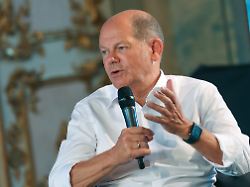Media informed about conflicts
Scholz reprimands communication from traffic light colleagues
08/19/2023 01:49 am
The blocked Growth Opportunities Act is just the latest example: the coalition partners are at odds – and always share their conflicts with the public. Chancellor Scholz would like a more discreet culture of debate. His government colleagues should follow his example.
Despite ongoing quarrels in the traffic light coalition, Chancellor Olaf Scholz wants to stick to his moderating leadership style. Regarding criticism that he was acting too cautiously as head of the federal government, he said at the “Augsburger Allgemeine Live” event: “The idea that you only have to say once, that’s the agreement now, and then everyone says: “Exactly, thank you it’s saying ‘great why not sooner’, which is honestly a bit childish.”
He pointed out that the coalition is supported by three different parties and that there are also cultural differences between the FDP and the Greens. However, Scholz criticized the fact that conflicts in the coalition of SPD, Greens and FDP are carried out too much via the media. What he does differently from others is that he doesn’t inform every journalist about who he’s talking to about what, and when. “And I wish that one or the other would take that as a role model and say: OK, we argue for three months, but we don’t give an interview about every conversation.”
This coalition must be able to do that. “And I think it’s swinging, but it’s still swinging, as we’re noticing right now,” said Scholz, referring to the recent dispute over Finance Minister Christian Lindner’s Growth Opportunities Act, which Family Minister Lisa Paus blocked. However, he is confident as far as further cooperation in the coalition is concerned, “because we have now actually decided on the essential points on which the differences between the three parties have to be developed into a common policy”.
Chancellor sees business location not endangered
When asked about the current recession in Germany, Scholz warned against painting a pessimism: “Difficulties are being talked about that have nothing to do with the strength of the German economy.” The fact is that Germany has more employees than ever before who are subject to social security contributions. The federal government knows where it wants to go. And if exports abroad pick up again, this will also lead to more economic growth in Germany.
As evidence, Scholz referred to the direct investments that are currently also being made from abroad, for example in semiconductor technology in Germany. Germany is an industrial country with a future, “we will be the production site for semiconductors in Europe,” said Scholz. Statements about the threat of de-industrialization would not fit in with this, but they are also simply not correct.
